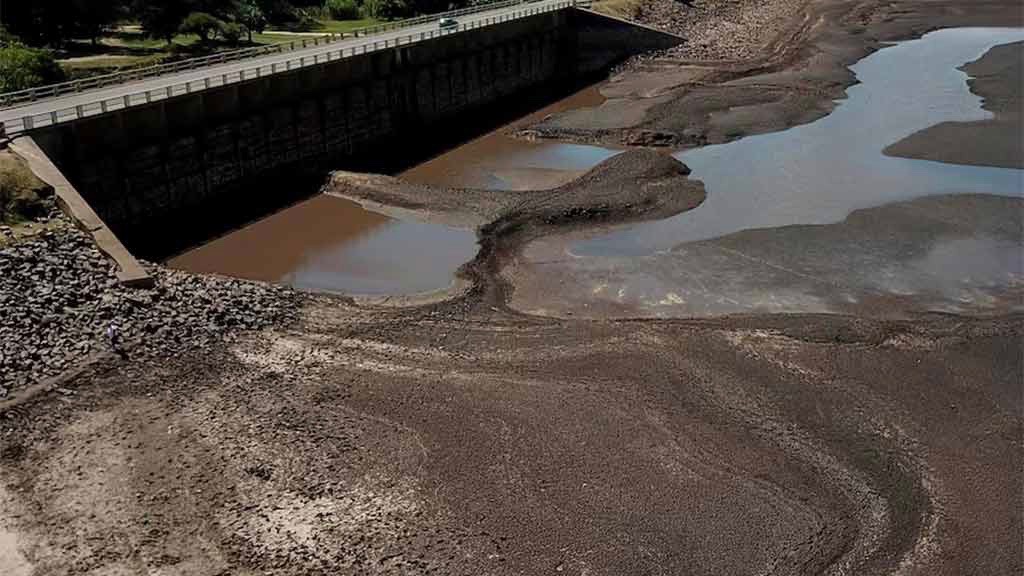Uruguay is suffering its worst drought in over 70 years. Extremely low rainfall levels and record high temperatures have left the country’s main reservoir dry and rivers depleted. However, environmentalists argue that the water crisis facing the capital Montevideo and the metropolitan area is not only a consequence of the drought caused by climate change, but also of the excessive use of water by agro-industrial activities. They have blamed the government for prioritizing water for transnationals and agribusiness at the expense of its citizens.
For the past eight months, the Montevideo metropolitan area has been facing a severe running water scarcity. The water levels at the Paso Severino reservoir, which supplies fresh water to the department where 60% of the country’s population lives, are critically low. The Paso Severino, Uruguay’s largest dam built on the Santa Lucía river, stores 67 million cubic meters of water. Today, it only has 1.3 million cubic meters of water, equivalent to 2% of its capacity.
Since May, the State Sanitation Works (OSE) has been mixing salt water from the La Plata river, an estuary connected to the Atlantic Ocean, into the supply to address the shortages. This has doubled the levels of sodium and chlorides for disinfection in tap water, exceeding the established standard norms. Residents have complained that the tap water is practically not suited for consumption and that they have been forced to buy bottled water, whose prices have increased five times in recent months. The situation has led to widespread dissatisfaction in the population. The country is recording at least one protest every week in defense of water for people.
On June 19, the government of conservative President Luis Lacalle Pou declared a water emergency in the department. The government also announced a series of measures to alleviate the crisis, such as distribution of two liters of free drinking water a day to the most vulnerable households, exemption of taxes on bottled water, and the promise to construct a new reservoir in 30 days. Environmental and social activists have criticized the measures as inadequate.
Water crisis in a country where it is a fundamental right
Carmen Sosa, a member of the National Commission in Defense of Water and Life, which in 2004 led the struggle to amend the Constitution to make access to drinking water a fundamental right, in conservation with Télam said that “our water resources have been looted by agribusiness and multinationals. Since 2004, water for human consumption has priority over other uses but this never happened.” “The rice industry consumes four times more water than the population, wood pulp 10 times more, soybeans 17 times more, and livestock 20 times more,” explained the activist.
“All enterprises take water from the rivers. The management of water resources were political decisions, it is not an environmental issue. Nobody thought about the people, it was obvious that we were going to run out of water,” added Sosa.
“We don’t have water to drink but the industries continue to have water, all the aquifers in Uruguay are taken over by the seven pulp mills. The political decisions that were made are contrary to what was established in 2004,” she criticized.
Uruguay is a significant producer of cellulose, whose production consumes a large amount of water. According to reports, 19 companies use more water than all the inhabitants of the country, among them the cellulose producing companies. Additionally, there are at least 486 private reservoirs of different sizes that divert water from rivers and streams for agribusiness.
Amid indignation over water supply problems, a plan to build a Google data center that would use millions of liters of water a day had sparked anger in the country, The Guardian reported. The giant has bought 29 hectares of land to build a data center in Canelones department in southern Uruguay. The center would use 7.6 million liters of water a day to cool its servers, equivalent to the domestic daily use of 55,000 people, according to the British newspaper.
Google’s upcoming data center isn’t the only project that is controversial. In April, the world’s largest pulp mill began operating in Uruguay, the third such mill in the country. The new plant, run by Finnish company UPM to create raw material for paper, is expected to use 129.6 million liters of water a day.
Regional countries offer aid
In the face of the water crisis, various countries in the region have offered their support to Uruguay in recent weeks to help alleviate the situation.
On Saturday, July 8, the government of Argentine President Alberto Fernández offered through its embassy to send a Navy ship with a capacity of 300 cubic meters of potable water and a mobile water treatment plant to deal with the problem of drinking water in Uruguay. The Lacalle Pou government accepted the aid after initially denying it.
On Saturday, Venezuelan President Nicolás Maduro also expressed his solidarity with Uruguay and offered his country’s “humble and modest help.” Days ago, Brazilian President Luiz Inácio Lula da Silva, Colombian President Gustavo Petro, and Chilean President Gabriel Boric also offered help, but did not get the go-ahead from the Uruguayan president.





